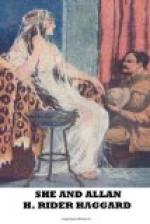“You will stop here, Hans, look after the young lady and nurse your foot,” I said sternly, whereon he collapsed with a sigh and asked for some tobacco.
Meanwhile Captain Robertson, who I think had been taking a stirrup cup to cheer him on the road, was making his farewells down in what was known as “the village,” for I saw him there kissing a collection of half-breed children, and giving Thomaso instructions to look after them and their mothers. Returning at length, he called to Inez, who remained upon the veranda, for she always seemed to shrink from her father after his visits to the village, to “keep a stiff upper lip” and not feel lonely, and commanded the cavalcade to start.
So off we went, about twenty of the village natives, a motley crew armed with every kind of gun, marching ahead and singing songs. Then came the waggon with Captain Robertson and myself seated on the driving-box, and lastly Umslopogaas and his Zulus, except the two who had been left behind.
We trekked along a kind of native road over fine veld of the same character as that on which Strathmuir stood, having the lower-lying bush-veld which ran down to the Zambesi on our right. Before nightfall we came to a ridge whereon this bush-veld turned south, fringing that tributary of the great river in the swamps of which we were to hunt for sea-cows. Here we camped and next morning, leaving the waggon in charge of my voorlooper and a couple of the Strathmuir natives, for the driver was to act as my gun-bearer—we marched down into the sea of bush-veld. It proved to be full of game, but at this we dared not fire for fearing of disturbing the hippopotami in the swamps beneath, whence in that event they might escape us back to the river.
About midday we passed out of the bush-veld and reached the place where the drive was to be. Here, bordered by steep banks covered with bush, was swampy ground not more than two hundred yards wide, down the centre of which ran a narrow channel of rather deep water, draining a vast expanse of morass above. It was up this channel that the sea-cows travelled to the feeding ground where they loved to collect at that season of the year.
There with the assistance of some of the riverside natives we made our preparations under the direction of Captain Robertson. The rest of these men, to the number of several hundreds, had made a wide detour to the head of the swamps, miles away, whence they were to advance at a certain signal. These preparations were simple. A quantity of thorn trees were cut down and by means of heavy stones fastened to their trunks, anchored in the narrow channel of deep water. To their tops, which floated on the placid surface, were tied a variety of rags which we had brought with us, such as old red flannel shirts, gay-coloured but worn-out blankets, and I know not what besides. Some of these fragments also were attached to the anchored ropes under water.




